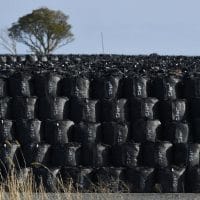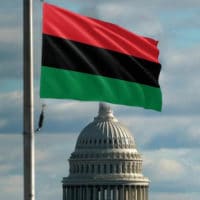-
George Washington and genocide
‘The immediate objects are the total destruction and devastation of [Iroquois Confederacy] settlements and the capture of as many prisoners of every age and sex as possible.… the country may not be merely overrun but destroyed.’ —Commands from George Washington to General Sullivan on May 31, 1779
-
Anatomy of a counter-insurgency
The defanging of the George Floyd Uprising was not accidental but was rather a deliberate attempt on the part of the American ruling class to regain social control in the wake of the largest and most militant protests in recent memory. This article examines the dimensions of how this defanging took place: how, within the space of two weeks, we went from burning down a police station to making small budgetary demands.
-
Hollywood and the Pentagon are cheating on the American public
Most propaganda machines are not observable to the naked eye, but the military-entertainment complex hides in plain sight. Long have Hollywood and the Pentagon worked together in what has been called a relationship of “mutual exploitation,” producing war agitprop for the masses. Who is the victim amid all this exploitation?
-
Tokyo Olympics and Fukushima “Revival”
At the 1964 Tokyo Olympics a young man born on the day of Hiroshima nuclear bombing was selected to be the last torch bearer on the relay, to signify that Japan had stood up from nuclear ruin. In an attempt to replicate the 1964 Olympic theme, the Abe government has constructed the idea of a Fukushima “revival,” a returned to normal. Exposing this illusion is an important cultural war.
-
A statue of Hatuey
As monuments to Columbus and confederate heroes topple and Democrats ponder which militarist they wish to glorify in their replacements, it is critical to realize that statues which go up are at least as important as the ones that come down. Perhaps the best nominee for a new statue is Hatuey, who led the first guerrilla warfare against European invasion of the western hemisphere.
-
Venezuela’s borderlands have been assaulted by COVID-19
Venezuela’s rate of infection remains low, despite the U.S. unilateral sanctions that have denied the country the right to import drugs and tests for the population.
-
How movements can turn public support into lasting change
Taking “movement moments” to change, from the Red Summer to Black Lives Matter.
-
U.S. must return its political prisoner Simón Trinidad to Colombia
Simón Trinidad matters; his time has come. This leader of the former Revolutionary Armed Forces of Colombia (FARC) faced bizarre and unfounded criminal charges in a U.S. court. He’s being held under the cruelest of conditions in a federal prison in Florence, Colorado. He will die there unless he is released. Simón Trinidad will be 70 years old on July 30.
-
Billions of children are being punished by the pandemic
There are immense casualties from this Great Lockdown. Incomes have collapsed for half the world’s population, while hunger rates are on the rise. But there are other casualties, other victims, often less remarked upon.
-
America liberated! Trump found in bunker!
An ad-hoc alliance of radical armies demanding justice for Black lives broke through federal barricades today to storm Capitol Hill.
-
Black socialist leader: ‘Demands must clarify our reality’
You see, not all Black folk look or think alike. And not every organization will have the same political analysis of the events before our eyes.
-
Who deserves the Nobel Peace Prize in a time of pandemic?
A few weeks ago, I was talking to Noam Chomsky about the state of the world. At one point, Noam smiled and said that he is not aware of any German doctors in Italy, even though both countries are in the European Union; instead, Cuban and Chinese doctors went to Italy to help the Italians fight the global pandemic.
-
Iran’s skyrocketing stock exchange signals historic political shift
In Iran, this spring brings a historic opportunity for neoliberal opposition parties personified by President Rouhani. The utopian dream will now get its first chance to prove itself as a cash-starved Islamic Republic embarks on its boldest ever embrace of privatization of state-owned companies.
-
Tear down the racist statues, end racist debt and pay for reparations
Bring down the statues, surely. But more than that: cancel the debt and provide reparations to the formerly colonized for the centuries of theft and brutality.
-
Dossier 20: Health is a political choice
In the United Nations’ Universal Declaration of Human Rights (1948), Article 25 offers an expanded vision of what it could mean to be a human being. Human beings, it notes, have ‘the right to a standard of living adequate for [their] health and well-being’. This includes ‘food, clothing, housing and medical care and necessary social services’; human beings also have the ‘right to security’, which means they have the right to compensation for any lack of livelihood due to circumstances beyond their control.
-
Economic collapse and unemployment councils—then and now
Hunger, homelessness, and evictions were features of the Great Depression in the United States. Jobs disappeared and working conditions deteriorated. Some “250,000 teenagers were on the road.” And how many others? By 1933 one third of farm families had lost their farms. Unemployment that year was 25 percent. The lives of working people were devastated.
-
The murder of George Floyd is normal in an abnormal society
There is no need to wonder why George Floyd (age 46) was murdered in broad daylight in Minneapolis, Minnesota, on May 25, 2020. The script of his death is written deep in the ugly drama of U.S. history.
-
Taiwan and WHO in the COVID-19 pandemic
The ruling establishment’s intrigue against the WHO might seem at odds with Taiwan’s failed bid to join the World Health Assembly (WHA) this past May, but there was no contradiction between Taiwan being seen fighting a David and Goliath-like battle with both the WHO and China, thereby flaring up geopolitical tensions from without. Both served the interests of the ruling class of Taiwan.
-
Facing the ecosocial crisis: Is a socialist planning of the economy feasible?
The current ecological and social crisis, a crisis which has seen its effects increased by a public health emergency caused by the COVID-19 pandemic, is a crisis which raises serious concerns over environmental sustainability and social polarization and which has a fundamental cause: the blind logic pursued by our economy system, where everything is secondary to profits.
-
Oil price collapse & the crisis
Is oil a stranded asset? Or is the system defunct? This thought-provoking talk was given by Andy Higginbottom, Associate Professor in the Politics Department of Kingston University in Britain. In this talk he looks at Marx’s theory of rent as surplus profit and its parallels within the oil markets.












![Oslo City Hall - The place where the Nobel Peace Prize is presented Oslo City Hall (Norwegian: Oslo rådhus) houses the city council, city administration, and art studios and galleries. The construction started in 1931, but was paused by the outbreak of World War II, before the official inauguration in 1950. Its characteristic architecture, artworks and the Nobel Peace Prize ceremony, held on 10 December, makes it one of Oslo's most famous buildings. It was designed by Arnstein Arneberg and Magnus Poulsson. The roof of the eastern tower has a 49-bell carillon which plays every hour. It is situated in Pipervika in central downtown Oslo. The area was completely renovated and rebuilt to make room for the new city hall, back in the late 1920s. In June 2005 it was named Oslo's "Structure of the Century" [Wikipedia.org]](https://mronline.org/wp-content/uploads/2020/06/29879653935_b62010aaca_c-200x200.jpg)







